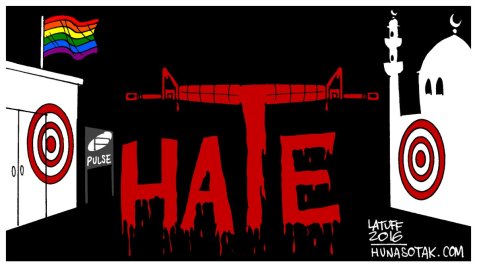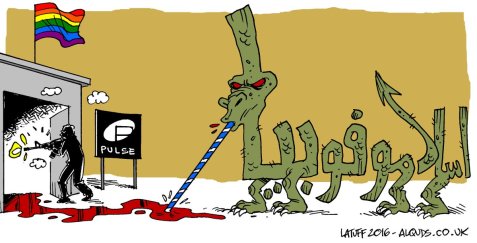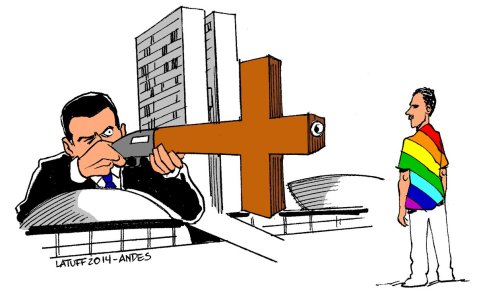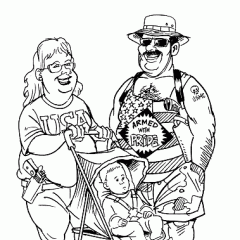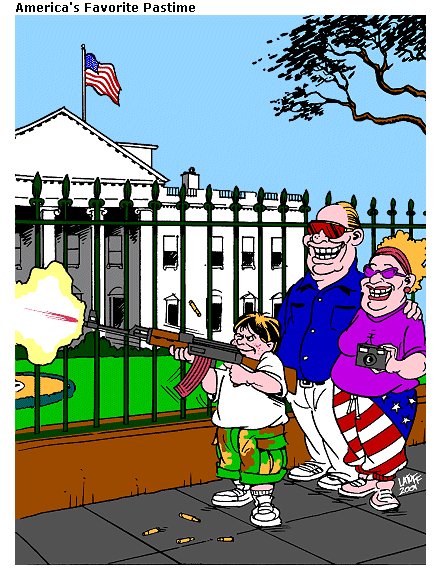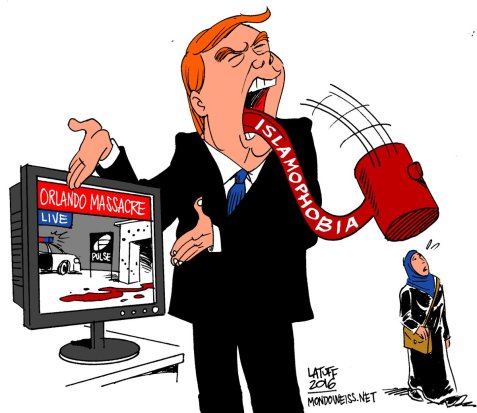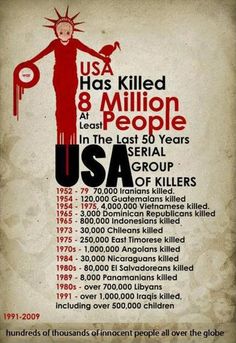Showing posts with label Latuff. Show all posts
Showing posts with label Latuff. Show all posts
Monday, December 05, 2016
Wednesday, July 27, 2016
Turkey and the DNC
THE ABSURD TIMES
Remember Turkey? Latuff.
Remember Latuff? Banned in Turkey and accused of all sorts of things.
These Two Weeks
By
@honestcharlie
In just about the entire world, people know about the staged coup in Turkey. They know about the ISIS terrorist attacks in France most recently and before that Germany. Actually, they know that Daesh not only gives Islam a bad name as nothing about the group is remotely Moslem, but they also give terrorism a bad name.
They also know that there is a new Prime Minister in England and that the funny fat guy who keeps running over children on the football field is Foreign Minister there (the one who looks like a fat Donald Trump).
In the United States, however, corporate media has pretty much blanketed the news channels with 24/7 infomercials about the two largest political parties, the neo-fascist and the neo-liberal, or Republican and Democratic, respectively.
Wikileaks released a ton of e-mails that showed, or rather documented what was already clear, the D party had no intention of allowing Sanders to be elected. Now, there are accusations that Russia, Putin, was behind it. The only real indication of this consists of a few letters from the Cryllic alphabet found in the code, or said to have been found in the code. As any mid-level programmer, or coder, know, there are many places to insert meaningless bits of information in the code that will have no effect, but that will help authenticate the programmer, or forge something. The fact is, however, those e-mails, or leaks, tell us nothing we did not already know. They simply documented it.
This was much like the leaks on Iraq and other glorious foreign policy moves the U.S. has made over the years.
Well, Das ist Alles fur Heute.
Wednesday, June 15, 2016
A LOOK AT HATE IN TOONS
From our favorite cartoonist and social commentator. A bunch of them, all relevant.
desertpeace posted: "All images by Carlos Latuff * * * * * * * "
|
Labels:
Islamophobia,
Latuff,
LGBTQ
Friday, August 21, 2015
ISLAMIC STATEMENT ON CLIMATE CHANGE
THE ABSURD TIMES
Illustration: From the great Latuff. (Not really related to our topic, but it has been awhile, so here it is. No explanation is needed.)
ISLAMIC STATEMENT ON CLIMATE CHANGE
BY
Czar Donic
One looks back with nostalgia of the times of the Cold War and slightly before. At that time, it was clear that in a matter of minutes, one could be completely vaporized. While some were busy buying expensive shelters with passageways that would somehow elude gamma radiation, the more sensible people were hoping that a nuclear bomb might land next door. One even mentioned a desire to try to catch it before it hit the ground. Our family, on the other hand, moved to a place where missal silos were rumored to be built. Whether or not there actually were missals there was irrelevant: if the "enemy" thought they were there, that place would be a target, making death that much more complete and rapid.
Today, we do not face that luxury. We have the inevitable outcome of making our own planet uninhabitable for ourselves within this century. In fact we have made it so and the environmentalists are optimists, or at least trying to make the near future less unlivable.
There was a time we could have reversed this trend. As late as the 70s, people became aware of something happening. Nixon began the EPA. People recognized that the ozone layer was being depleted. Ozone kept things so people could still lie in the sun, so saving it was important. Ozone is O3 and that means it has an extra O in it. The stuff that deodorants and freon were made of lacked an O, so once up there in the air, it could grab one of the Os and make carbon dioxide. (This is very simplistic, and still I've lost a few here.) Anyway, the process turned out also to be a chain reaction, so there was a move to ban that offending stuff and the ozone layer is reasonably safe.
However, other stuff kept accumulating up there and now there is so much that the process is irreversible. Steps should have been taken in the 80s, but by then Reagan was screwing with everything American, so things went to hell and have been declining since. For example, we often hear of clear, clean water. Sometimes blue water, although it looks brown, or green. Here is the U.S. of A., we have ORANGE water flowing in our rivers. No, I'm not making that up. Still, the rate of deterioration can be slowed. Anyway, here's some documentation and efforts:
THURSDAY, AUGUST 20, 2015
Islamic Leaders Take on Climate Change, Criticizing "Relentless Pursuit of Economic Growth"
A group of leading Islamic scholars have issued a declaration calling on the world's 1.6 billion Muslims to do their part to eliminate dangerous greenhouse gas emissions and turn toward renewable energy sources. The declaration urges world leaders meeting in Paris later this year to commit to a 100 percent zero-emissions strategy and to invest in decentralized renewable energy in order to reduce poverty and the catastrophic impacts of climate change. The declaration comes on the heels of the publication of Pope Francis's encyclical on the environment earlier this year, which also calls for sweeping action on climate change. Like the encyclical, this declaration, endorsed by more than 60 leading Islamic scholars, links climate change to the economic system, stating: "We recognize the corruption that humans have caused on the Earth due to our relentless pursuit of economic growth and consumption." We speak to Bangladeshi climate scientist Saleemul Huq, one of the contributors and signatories to the Islamic Declaration on Global Climate Change.
TRANSCRIPT
This is a rush transcript. Copy may not be in its final form.
NERMEEN SHAIKH: We turn now to a sweeping climate change declarationissued by the world's leading Islamic scholars, calling on the world's 1.6 billion Muslims to do their part to eliminate dangerous greenhouse gas emissions and turn towards renewable energy sources. The declaration urges world leaders meeting in Paris later this year to commit to a 100 percent zero-emissions strategy and to invest in decentralized renewable energy in order to reduce poverty and the catastrophic impacts of climate change.
The declaration comes on the heels of the publication of Pope Francis's encyclical on the environment earlier this year, which also calls for sweeping action on climate change. Like the encyclical, this declaration, endorsed by more than 60 leading Islamic scholars, links climate change to the economic system, stating, quote, "We recognize the corruption that humans have caused on the Earth due to our relentless pursuit of economic growth and consumption." It places special emphasis on richer countries and communities, noting that the risks of climate change are, quote, "unevenly distributed, and are generally greater for the poor and disadvantaged communities of every country, at all levels of development."
AMY GOODMAN: To talk more about the significance of this declaration, we go to London to speak with Saleemul Huq, one of the contributors and signatories to the Islamic Declaration on Global Climate Change, a climate scientist at the International Institute for Environment and Development in London, and director of the International Center for Climate Change and Development in Bangladesh.
Saleemul Huq, welcome back to Democracy Now! Talk about what prompted the declaration, who wrote it, and who were the major signatories on it.
SALEEMUL HUQ: I think the origin of this came some—a few months ago, when the Climate Action Network, a group of climate activists, got together with the Islamic Relief Worldwide, a humanitarian Islamic organization that does quite a lot of work with vulnerable communities around the world. And they agreed that this was something that they should take up, and got in touch with Islamic scholars and leading clergy around the world, and started drafting a potential declaration of this kind. And then they held a two-day symposium in Istanbul, which ended just a day or so ago, where they brought about 60 international scholars, Muslim scholars, leading clergy from different countries, and we—and then invited me as a climate scientist to join them, also a Muslim, as well. And we honed the final declaration, which came out and has been released.
And it's aimed very much at the 1.6 billion Muslims around the world, bringing to their attention the verses of the Holy Qur'an, which enjoin Muslims everywhere to preserve the environment as stewards of the environment, and at the same time not cause harm to other people by their own pollution and greenhouse gas emissions, and so, at a personal level, to reduce our emissions, and, at a global level, to join efforts by all faiths and all countries to bring down the fossil fuel use to zero as soon as possible.
NERMEEN SHAIKH: Well, last month, Democratic presidential candidate Martin O'Malley made headlines by suggesting that the rise of the so-called Islamic State came about in part because of the effects of climate change. He was speaking on Bloomberg TV. Let's go to a clip.
MARTIN O'MALLEY: One of the things that preceded the failure of the nation-state of Syria and the rise of ISIS was the effect of climate change and the mega-drought that affected that region, wiped out farmers, drove people to cities, created a humanitarian crisis. It created the symptoms, or, rather, the conditions, of extreme poverty that has led now to the rise of ISIL and this extreme violence.
NERMEEN SHAIKH: Dr. Saleemul Huq, your response? I mean, to what extent do you think the conflicts in Syria, Iraq, etc., Yemen, are exacerbated by climate change? Can the creation of ISIS really be attributed to the effects of a changing climate?
SALEEMUL HUQ: I think that—I don't think there's a direct attribution of the rise of ISIS as an organization to climate change, but there is no denying the underlying logic of the statement that we just heard, which is that there was a continuing drought for quite a few years in Syria that predates the conflict, the civil war, and the rise ofISIS, and caused migration and refugees going from the rural areas to urban areas. And that's the kind of thing that climate change is likely to cause in future, and almost certainly will cause future conflicts.
NERMEEN SHAIKH: And, Dr. Huq, what does the declaration call on some of the Muslim-majority oil-producing countries to do? They're the ones with among the least incentives to cut down on fossil fuels, since they're dependent on them for their economy.
SALEEMUL HUQ: Well, first of all, it enjoins all the Muslims in those countries, as individuals, to do what they can to reduce their own carbon footprints and also to help their fellow Muslims, who very often are amongst the most vulnerable people to the impacts of climate change, people like Muslims living in Pakistan, in Bangladesh, my country, and in parts of Africa. Many of these are Muslims who are suffering the consequences, and therefore those of us who are better off have a duty to help them, protect them and to stop causing the pollution that is causing the impacts on them, and at the same time hope to influence the leaders of these countries that it's in their own best interest to move away from fossil fuels in the long run. And indeed, this is beginning to happen. If you look at the leaders of Abu Dhabi, for example, they are investing heavily in solar energy and in renewable energy, because they know that their oil is not going to last forever.
AMY GOODMAN: Saleemul Huq, we want to thank you for being with us, one of the contributors and signatories to the Islamic Declaration on Global Climate Change, climate scientist at the International Institute for Environment and Development in London, director of the International Center for Climate Change and Development in Bangladesh.
Labels:
climate change,
global warming,
Islamic,
Latuff,
ozone
Thursday, October 23, 2014
Boycott Israel and Everything Else
THE ABSURD TIMES
Illustration: Latuff on boycott Israel.
Well, Carlos, it was great while it lasted, but you have fallen from your number three ranking of the world's leading anti-Semites. When he was named number three a short while ago, there was much rejoicing and many accolades due and paid to him. After all, numbers one and two are uncontested as one of them is the leader of Iran and the other we can't remember. At the time, European Football (soccer) Fans ranked number four and to beat out so many millions is a feat much to be envied. Now there is a new number three and we feature him below in an interview. He was with the UN and points out that even 10% objectivity would lead one to condemn Israel, but so it goes.
This, of course, is the main story. In other news, the U.S. dropped weapons to the Kurds, but they landed in the hands of ISIS. Attempts are made to minimize the importance of this, but imagine the impact it has on religious zealots that shout "AlluAkbar" every time they pull a trigger.
Canada's Parliament got shot up. All of this, of course, is welcome as it gives cable news stations a break from Ebola. It also manages to keep attention away from the fact that the prosecutor on the Ferguson case had leaked that Brown did not have his hands up when he was killed by the cops.
Anyway, here is the interview on Israel:
TUESDAY, OCTOBER 21, 2014
Former U.N. Special Rapporteur Richard Falk on the Legitimacy of Hope in the Palestinian Struggle
On Monday, the Israeli government made a rare appearance before the United Nations Human Rights Committee, but its delegation refused to acknowledge responsibility for the conditions in the West Bank and Gaza Strip, occupied by Israel for nearly half a century. We speak to a legal expert who has just spent six years trying to hold Israel to account for its actions in the Occupied Territories. Richard Falk recently completed his term as special rapporteur on Palestinian human rights for the United Nations Human Rights Council. His writings about the Israel-Palestine issue and his experience as U.N. rapporteur are compiled in the new book, "Palestine: The Legitimacy of Hope."
TRANSCRIPT
This is a rush transcript. Copy may not be in its final form.
AARON MATÉ: We turn now to Israel and the Occupied Territories. On Monday, the Israeli government made a rare appearance before the U.N. Human Rights Committee. Each member state is reviewed every four years for its compliance with the International Covenant on Civil and Political Rights. That task was especially significant coming just weeks after Israel ended an assault on Gaza that killed nearly 2,200 Palestinians, including more than 500 children. Emi Palmor, the director-general of Israel’s Justice Ministry, pledged her government’s "sincere approach" to the panel’s mandate.
EMI PALMOR: We decided to bring along the highest-ranking experts on the issues that we are supposed to answer. And indeed, you can see that for the first time the director-general, myself, is heading the delegation. The deputy attorney general, Dr. Schöndorf, is second on the delegation, and the others as were presented during the session. And we believe that this shows our seriousness, the sincere approach of Israel to these issues.
AARON MATÉ: That’s Emi Palmor, head of the Israeli delegation to the U.N. Human Rights Committee. But as the session got underway, a key problem emerged: Israel would not be answering for conditions in the West Bank and Gaza Strip, the territory it’s occupied for nearly half a century. While Israel provided a written report for human rights within its own borders, it did not agree the covenant applies to its actions in the Occupied Territories. In response, two U.N. panelists expressed their frustration.
CORNELIS FLINTERMAN: We have that information about the doubling, the recent announcement in Israel of further expansion of the settlements in the occupied Palestinian territories and in East Jerusalem. So, that was the reason that I raised the question. It seemed that no attention had been given whatsoever to our earlier recommendation.
NIGEL RODLEY: Of course, they’re not responsible for the violations that may be committed by Hamas. Of course they’re not. But they are responsible for any violations that may be their own responsibility. It’s not an issue of legal jurisdiction one way or the other; it’s an issue of who has control.
AMY GOODMAN: That’s Nigel Rodley from Britain and, before that, Cornelis Flinterman. As it turned out, the assault on Gaza did not receive the scrutiny that had been expected. As The Jerusalem Post reported at day’s end, Israel’s Emi Palmor, quote, "said she was relieved that the delegation had not been extensively quizzed about the IDF’s military actions in Gaza this summer under Operation Protective Edge. Israel had imagined that committee members would focus on that issue," The Jerusalem Post said.
Well, we’re still joined by a legal expert who’s just spent six years trying to hold Israel to account for its actions in the Occupied Territories. Richard Falk has just completed his term as special rapporteur on Palestinian human rights for the United Nations Human Rights Council. His writings about the Israel-Palestine issue and his experience as U.N. rapporteur are compiled in a new book. It’s out today. It’s calledPalestine: The Legitimacy of Hope. Richard Falk is professor emeritus of international law at Princeton University and research professor in the global studies department at UC Santa Barbara. He presented the Edward Said Memorial Lecture last night at Columbia University.
Can you talk about, well, just that, this latest news on what is happening right now with Israel and Gaza?
RICHARD FALK: Well, as far as their cooperation with the U.N. is concerned, this report that you just showed your audience is very misleading. They have refused to cooperate with the Commission of Inquiry in—that the Human Rights Council appointed to look into the allegations of war crimes associated with the attack on Gaza in July and August. And they refused to cooperate with my successor, an Indonesian diplomat who they favored, actually, and they persuaded the president of the Human Rights Council to appoint, with the expectation that they would cooperate with him. But as I’ve said all along, you only have to be 10 percent objective to come to the same critical conclusions that I came to in relation to Israel’s violation of fundamental human rights in the West Bank, East Jerusalem and Gaza, the three segments of occupied territory.
AMY GOODMAN: What is that conclusion that you came to?
RICHARD FALK: Well, the conclusion is flagrant violations that are official policy—it’s not deviations—from the extension of the settlements as a violation of international humanitarian law, not disallowing transfer of the occupying country’s population to the occupied society, the imposition of a regime of collective punishment on the whole civilian population of Gaza. And locking that civilian population into the combat zone during Protective Edge is a distinctive atrocity, where women and children were not allowed to become refugees, and there was no opportunity to be an internally displaced person. As horrible as things were for civilians in Syria and in Iraq in recent years, they always had—the civilian population always could leave the combat zone. Here, they’re literally locked into the combat zone, and only those Gazans with foreign passports were allowed to leave. That involved 800 people out of 1,800,000. So it is a very extreme situation that is not treated as an ongoing humanitarian catastrophe for geopolitical reasons. The U.S. has a geopolitical veto over what the U.N. can do in relation to a situation of this kind. We react to Kobani, as we spoke earlier, but we ignore what is happening day by day in Gaza, particularly, but to a lesser extent, in the West Bank.
AARON MATÉ: Well, you mentioned the U.S. Can you talk about the obstacles that you faced as you tried to raise these issues over these past six years as the top U.N. investigator in the territories?
RICHARD FALK: Well, there were two main kinds of obstacles. I was very much attacked in a kind of defamatory way by UN Watch and other very extreme Zionist organizations, which tried—wherever I went, anywhere in the world, they would try to prevent me from speaking and mounted a kind of defamatory campaign, called me an anti-Semite, a leading anti-Semite. The Wiesenthal Center in L.A. listed me as the third most dangerous anti-Semite in the world, which was—made me feel I must be doing something right in this role. And the only two people that were more dangerous than I was the supreme leader of Iran and the prime minister of Turkey, Erdogan. And other—
AMY GOODMAN: U.S. Ambassador to the United Nations Samantha Power called you, as you were leaving your U.N. post, a—talked about your "relentless anti-Israeli bias."
RICHARD FALK: Well, it certainly has been a consistent anti-Israeli critical narrative, because that’s what the reality is. I mean, if you take international law seriously and, as I said, you’re 10 percent objective, you have to come to these conclusions. And that’s why this Indonesian, who was determined to please Israel—he told me that—it turned out that they—
AMY GOODMAN: Makarim Wibisono.
RICHARD FALK: Yes. It turned he’s already angered Israel, because you can’t—you can’t look at these realities without coming to these conclusions, unless you completely somehow blindfold yourself.
AARON MATÉ: Well, let’s talk about what Palestinians are trying to do now—the Palestinian Authority, at least. The PA has drafted a U.N. Security Council measure that would impose a three-year deadline for Israel to end the occupation of the West Bank and Gaza. Speaking at the U.N. last month, Palestinian lawmaker Hanan Ashrawi dismissed the threat of losing U.S. government support.
HANAN ASHRAWI: We will be seeking a Security Council resolution on ending the occupation within that specified date. And any solution must be based on international law, cannot violate international law and U.N. conventions and agreements. If the U.S. wants to isolate itself as a reaction to Palestinians joining the international community, then they are welcome to do that. The American funding is not that essential to Palestinian survival. Quite often, joining the international community, having the protection of the law and so on is much more important than getting some funding from Congress that is conditional.
AARON MATÉ: Hanan Ashrawi went on to say, quote, "Enough is enough. What has the U.S. done for us?" And, in fact, there was a report last week that Secretary of State John Kerry has asked the PA to delay its U.N. Security Council bid measure here, proposal, until after the midterm elections. Is the PA actually distancing itself from this whole U.S. process? And is that important?
RICHARD FALK: Well, it’s caught between the militancy of its own people and this kind of pragmatic adaptation to the power situation, and its economic dependence on funding that is controlled by Israel and the U.S. And also, its security forces have been—the PA’s security forces have been trained under U.S. authority. So it’s a—they’re in a very compromised position. So the Palestinian Authority leadership, in order to retain some modicum of legitimacy, has to appear to be reflecting the will of the Palestinian people. And they’ve been trying to walk this tightrope all along, and it becomes more and more difficult. And the recent polls show that Hamas, even on the West Bank, would now win an election if an election was held. And that’s not because there’s a shift toward an Islamic orientation. It’s because Hamas, for all its problems and failures, resists and is resilient and has maintained the spirit of resistance that’s so important to the political morale of the Palestinian movement.
AARON MATÉ: On the issue of resistance, you talked last night about the importance of defending the right to resist, but advocating peaceful resistance. Can you talk more about this vis-à-vis the Palestinian struggle?
RICHARD FALK: Well, I don’t purport to speak for the Palestinians. And one of the tragedies of the Palestinians, ever since the Balfour Declaration, is that others have decided what’s good for Palestine. And so, what I was—I was partly being descriptive. The Palestinians have failed with armed struggle. They failed, with the Arab neighbors, trying to liberate Palestine from Israeli control. They failed with the Oslo-type intergovernmental diplomacy. So what they’ve tried in the last several years, increasingly, is a combination of nonviolent resistance in various forms within the occupied territory and this growing global solidarity movement that has centered on the BDS campaign.
I think that’s—and I don’t say—I wouldn’t judge their desire to or their feeling that the only effective form of resistance is to defend themselves violently. I mean, that’s a decision that I don’t think it’s appropriate for someone outside the context of oppression to make. Hamas, which is accused of being a terrorist organization, of course, has limited its violence since its political election in 2006 to responding to Israeli provocations. It hasn’t used violence as a way of promoting the empowerment of a Palestinian movement of liberation. In fact, its politics have been directed toward long-term peaceful coexistence with Israel, if Israel withdraws to the '67 borders. It's offered a 50-year plan of peaceful coexistence.
AMY GOODMAN: We’re going to end where you begin, and that’s the title of your book, Palestine: The Legitimacy of Hope. Richard Falk, what do you mean by "the legitimacy of hope"?
RICHARD FALK: What I mean is that if you look at the way in which conflicts have been resolved since the end of World War II, particularly involving foreign domination or foreign rule in a Third World country, the decisive factor in their resolution has been gaining the high ground of international morality and international law. And not having—military superiority has not produced political outcomes favorable to the intervening or the more powerful side. And so, the hope comes from this pattern of gaining legitimacy, in what I call "legitimacy war," being more significant politically than being able to control the results on a battlefield. And that’s a profound change in the whole structure of power in the world that hasn’t been absorbed by either Israel or the United States.
AMY GOODMAN: Richard Falk, we want to thank you for being with us, just completed his six-year term as United Nations special rapporteur on Palestinian human rights, a prolific writer. His book, Palestine: The Legitimacy of Hope, has just been published today. Professor emeritus of international law at Princeton University and research professor in the global studies department at UC Santa Barbara, he presented the Edward Said Memorial Lecture last night at Columbia University.
This is Democracy Now!
 The original content of this program is licensed under a Creative Commons Attribution-Noncommercial-No Derivative Works 3.0 United States License. Please attribute legal copies of this work to democracynow.org. Some of the work(s) that this program incorporates, however, may be separately licensed. For further information or additional permissions, contact us.
The original content of this program is licensed under a Creative Commons Attribution-Noncommercial-No Derivative Works 3.0 United States License. Please attribute legal copies of this work to democracynow.org. Some of the work(s) that this program incorporates, however, may be separately licensed. For further information or additional permissions, contact us.
Subscribe to:
Posts (Atom)









